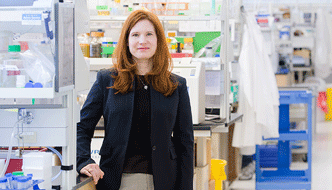Two faculty members have been invited to join the World Economic Forum’s Network of Global Future Councils. Cynthia Collins, associate professor of chemical and biological engineering, has been selected for the Global Future Council on Biotechnologies, and Heng Ji, the Edward P. Hamilton Development Chair and associate professor of computer science, has been selected for the Global Future Council on the Future of Computing.
The Network of Global Future Councils serves as a forward-looking brain trust to the World Economic Forum (WEF). It is a global community of over 800 thought leaders who are experts in their fields in academia, business, government, and international organizations. The network is grouped in 35 councils, each comprised of 25 members representing all regions and sectors of society, who commit their knowledge and expertise to address the most pressing issues and opportunities of our time through new thinking and solutions.
Global Future Council members explore how developments in their field could impact industry, governments, and society in the future, and design innovative governance models that ensure that their benefits are maximized and the associated risks kept under control.
“The research programs of Professors Collins and Ji represent advances at the interface of basic research and societal need,” said Jonathan Dordick, vice president for research at Rensselaer.

Heng Ji
“Heng Ji’s research is advancing natural language processing that is critical in cognitive computing. Her inclusion to the Council on the Future of Computing will enable her to impart critical knowledge and technology that can influence decision-makers in nearly all of the companies represented in the World Economic Forum,” he said. “Cynthia Collins’s research at the nexus of synthetic biology and human health is perfectly linked to the Council on Biotechnologies, and will provide strong guidance to biotechnology, pharmaceutical, and health-care companies worldwide.”
The research programs of Professors Collins and Ji represent advances at the interface of basic research and societal need.”—Jonathan Dordick

Cynthia Collins
In her research, Cynthia Collins focuses on microbiome dynamics and behavior and increasing the ability to understand and manipulate microbial communities in different environments, from the human body to bioreactors to the built environment. Her insights into microbiomes are essential for addressing key societal issues, from obesity to early childhood development.
Heng Ji, an expert in natural language processing, focuses on cross-source information extraction on a massive scale. She aims to create the next generation of information access in which humans can communicate with computers in natural languages, beyond keyword search, and computers can discover accurate, concise, and trustable information from these heterogeneous data sources.
Council members serve two-year terms, during which they meet virtually with their peers throughout the term and in person annually at the Meeting of the Global Future Councils, which will take place this year on November 13 and 14 in Dubai, United Arab Emirates.
Both Collins and Ji were also selected this year as World Economic Forum Young Scientists, a group of 50 of the world’s rising stars in science and engineering who have a track record of advancing the frontiers of knowledge in areas of societal impact. They both attended the World Economic Forum Annual Meeting of the New Champions held in Tianjin, China, in June.


